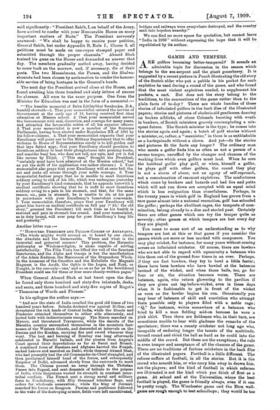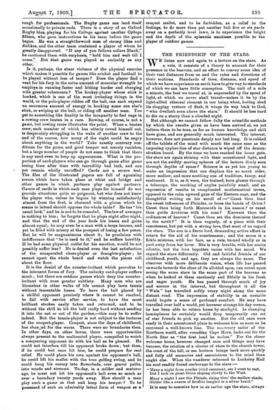GAMES AND TEMPERS.
ARE golfers becoming better-tempered? It sounds an admirable topic for discussion in the season which belongs to the sea-serpent and the giant gooseberry. It is suggested by a recent picture in Punch illustrating the old story of the Scotch elder who put a pebble in his pocket for eaeli expletive he used during a round of the game, and who found that the most violent expletives needed, to supplement his pockets, a cart. But does not the story belong to the traditions, to the conventions of the game rather than to the plain facts of to-day ? There are whole bundles of these stories of infuriated golfers in the back files of the illustrated papers; stories and pictures of choleric old gentlemen dancing on broken niblicks, of obese Colonels bursting with wrath in bunkers, of Scotch ministers gravely contemplating a mis- spent future. The Scotch minister is the type ; he comes into the stories again and again ; a batch of golf stories without a minister, or, rather, a "meenister," in them is as unthinkable as a harlequinade without a clown. And yet—do the stories and pictures fit the facts any longer ? The ordinary man who meets a golfer finds him as often as not a person of a serene temper, unruffled by the changes and chances of the working lives which even golfers must lead. When he sees the habitual . golfer play golf, or when, himself a golfer, he plays golf with other golfers, the round they play is not a storm of abuse, not an agony of self-reproach, not a concatenation of resonant expletives. The misfortunes which come by bunkers and hazards and bad lies and putts, which will not run down are accepted with an equal mind which is less resignation than cheerfulness. Perhaps, in the twenty years in which golf in England has grown from a rare game almost into a national recreation, golf has schooled the golfer; perhaps the ebullient rages, the tempests of corn- raination, belong already 'to a dim and storied past. Certainly there are other games which can try the temper quite as severely; other games at which tempers are lost every day they are played.
You come to some sort of an understanding as to why tempers are lost at this or that game if you consider the games which are more or less marked with composure. You may play cricket, for instance, for many years without coming across an infuriated cricketer. Of course, there are bowlers who are not able to regard with equanimity a batsman who hits them out of the ground four times in an over. Perhaps, if they are fast bowlers, they try to bowl a little faster; there have been bowlers who have bowled at the batsman instead of the wicket, and when those halls, too, go for four or six, the situation becomes worse. There are batsmen, again, who return glowering to the pavilion if they are given out leg-before-wicket, even in these days when it is fashionable to get in front of the wicket as soon as the bowler begins his run. Occasionally you may hear of batsmen of skill and conviction who attempt feats possible only to players filled with a noble rage ; "Q," for instance, writes somewhere of a batsman who tried to kill a man fielding mid-on because he wore a pink shirt. Then there are fieldsmen who, in their tarn, are sometimes unable to bear with gladness the remarks of the spectators ; there was a county cricketer not long ago who, incapable of enduring longer the taunts of the multitude, turned round and Shied the ball as hard as he could into the middle of the crowd. But these are the w4ceptione; the rule is even temper and acceptance of all the chances of the game. There are no traditions of furious .cricketers in the back files of the illustrated papers. Football is a little different. The referee suffers at football, in all the stories. But it is the crowd who assault him, or who carry, him away to drown bite, not the players; and the kind of football in wliich referees are ill-treated is not the kipd which you think of first as a game. At school and at the Universities, where the best football is played, the game is friendly always, even if it can be pretty rough. The Winchester, game and the Eton wall- game are rough enough to test schoolboys ; they would be too rough for professionals. The Rugby game can lend itself occasionally to private ends. There is a story of an Oxford Rugby blue, playing for his College against another College fifteen, who. gave instructions to his team before the game began. He was a straightforward man of strong likes and dislikes, and the other team contained a player of whom he greatly disapproved. "If any of you fellows collars Blank," he cautioned them with emphasis, "hold him and wait till I come." But that game was played as amicably, as any other.
Is it, perhaps, the sheer violence of the physical exercise which makes it possible for games like cricket and football to be played without loss of temper ? Does the player find a vent for his fury in the extra amount of muscular strength he emPloys in running faster. and bitting harder and charging with greater vehemence ? The hockey-player whose stick is hooked, which is one of the, most irritating things in the world, or the polo-player ridden off the ball, can each expend an enormous amount of energy in hooking some one else's stick, or swiping at the ball, or riding off another man. You get to something like finality in the incapacity to feel rage in a rowing crew beaten in a race. Rowing, of course, is not a game, but rowing races illustrates the point. When a beaten crew, each member of which has utterly rowed himself out, is desperately struggling in the wake of another crew to the end of the course, how many of the eight could be angry about anything in the world ? Take exactly contrary con- diticins for the game, and goOd temper not merely vanishes, but a large number of people do not seem to think that there is any need even to keep up appearances. What is the pro- portion of card-players who can go through game after game losing time after time with incredibly bad luck, and can yet remain wholly unruffled ? Cards are a severe test. The files of the illustrated papers are full of agonising scenes which have taken place at whist and bridge and other games in which partners play against partners. Games of cards in which each man plays for himself do not provide situations quite so poignant, but who does not know the player who, unless he begins by winning satisfactorily almost from the first, is obsessed with a gloom which be seems to intend should oppress the whole table? He has" his usual luck," and he is not to be consoled. The law of averages is nothing to him ; he forgets that he plays night after night, and that the end of the year finds his losses and gains almost equal; he may even be a man with a large income, and yet be filled with misery at the prospect of losing a few pence. But he will be magnanimous about it; he proclaims with indifference that "he is used to it," and he suffers horribly. If he had some physical outlet for his emotion, would he not possibly suffer less ? He is denied even the laSt satisfaction of the exasperated chess-player or draughts-player ; he cannot upset the whole board and watch the pieces roll about the floor.
It is the denial of the counter-irritant which provokes to the intensest forms of fury. The unlucky card-player suffers much ; but there are outdoor games which deny the counter- irritant with even greater subtlety. Many men who are blameless in other walks of life cannot play lawn tennis without lamentable losses. To have the ball placed by a skilful opponent precisely where it cannot be reached, to fail with service after service, to have the most brilliant strokes easily taken and returned, and to be withOut the skill to bit the ball really bard without sending it into the net or out of the garden,—this may be to suffer indeed. But the tennis-player is not subject to the tortures of the croquet-player. Croquet, since the days of childhood, has clianL;ed for the worse. There were no boundaries then. In other days, on other lawns, there were opportunities always present to the maltreated player, compelled to watch a conquering opponent do with his ball as be pleased. He could not interfere till his opponent broke down ; but then, if he could but once hit him, be could prepare for real relief. He could place his own against his opponent's ball, he could lift his mallet with the true golfing swing, and he could bang his enemy into flowerbeds, over gravel paths, into woods and streams. To-day, in a milder and maturer age, he must not hit his opponent's ball even so much as over a boundary twenty yards away. How should a man play such a game as that and keep his temper ? To be possessed of such an admirably lethal form of weapon as a
croquet mallet, and to be forbidden, as a relief to the feelings, to do more than pat another ball five or six yards away on a perfectly level lawn, is to experience the height and the depth of the splenetic sanotieas possible to the player of outdoor games.







































 Previous page
Previous page